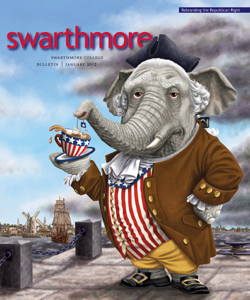Love of Learning Reaffirmed for Mid-Career Teachers
Long after the usual start of their workday, 15 teachers drawn from schools in the Wallingford-Swarthmore School District gathered last October in Bond Memorial Hall. Fortified by coffee and pastries, they settled into a space that was illuminated by soft light through leaded-glass windows and furnished with a grandfather clock, cushioned armchairs, and round tables. Lines from Emerson carved over the large fireplace welcomed the group: “All things through thee take nobler form and look beyond the earth.” But on this day, and again two weeks later, the teachers would look at the earth, in the seminar Global Demographics, led by Swarthmore Professor of Political Science Tyrene White.
The seminar was the first to occur at the College under the auspices of the Teachers As Scholars (TAS) program, funded for two years by the Woodrow Wilson National Fellowship Foundation in partnership with the College and the school district. Established at more than 25 universities nationwide, the program was suggested by District Superintendent Richard Noonan to encourage professional development for teachers in collaboration with local colleges. TAS allows teachers of any grade level and subject to participate in discussions of scholarly issues during several full-length school days that include lunch. In addition to White’s seminar, the Swarthmore program will offer the class Natural History in the Crum Woods by Professor of English Literature Betsy Bolton in spring. Next year, four seminars are planned, with teachers from multiple school districts.
“The course was designed as an opportunity for teachers to learn something new and wonderful and rich, but also to re-ignite their passion for learning—to nourish their minds again,” says TAS coordinator Catherine Dunn ’93, who taught English in the Wallingford-Swarthmore school district for 14 years. For Kelly Hines Yiadom ’01, who teaches fourth grade at Nether Providence Elementary School, and Eleanor Salgado ’03, chair of the Strath Haven Middle School English Department, the location was a familiar one. Salgado said, “It’s great to be able to have this break to think as a student, time to think and talk as an adult,” a sentiment echoed by all the teachers.
White led the discussion but encouraged interaction with the teachers, who had received suggested readings in advance. “This is the quintessential ‘global’ topic,” she said. “There’s something for everyone.” With the world population reportedly surging past seven billion, the subject was timely. “As much as people talk today about overpopulation, they are really just asking variations of questions that were being asked 150 years ago,” White said. She showed that today, despite lower birth rates in developed countries, the biggest concern for policymakers is how to support vastly increased aging populations. She also discussed global migration, the HIV epidemic, and sustainability. Teachers contributed a constant stream of observations and questions based on their own classroom studies as well as their personal reading and travel experiences.
Sixth grade social studies teacher Claudia Carlsson said: “These opportunities energize you. I wrote to Dr. Noonan, ‘I haven’t experienced anything like this in 24 years.’ It’s really a treat.” She anticipates reviving a Population Day event using materials from the course.
But the response to TAS doesn’t always translate into classroom action—nor is it meant to. “It’s important for teachers to be educated beyond their area of teaching,” said middle-school German teacher Valerie Rouse.
In this program of scholarly fellowship, with its informal setting and easy exchange between teacher-scholars and professor, the teachers found their love of learning reaffirmed. Middle School social studies teacher Bernadette Smith explained it this way: “You have been introduced to an expert in her field. You have time to be thoughtful—which you don’t have during the school day. You have a chance to converse with other professionals about how to incorporate [new ideas] in your curriculum. It broadens your world view.”
 Email This Page
Email This Page